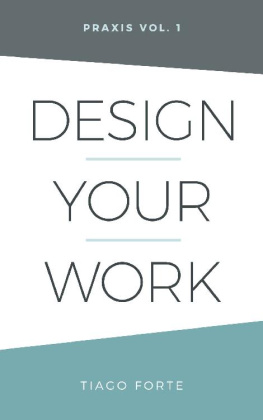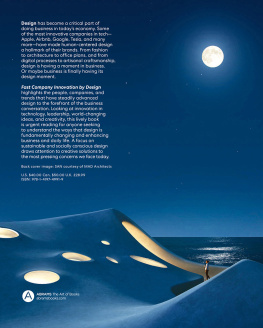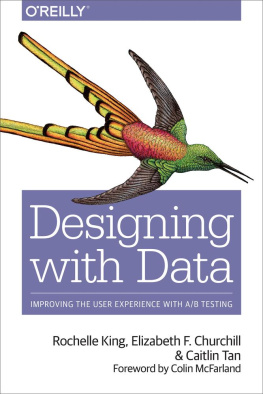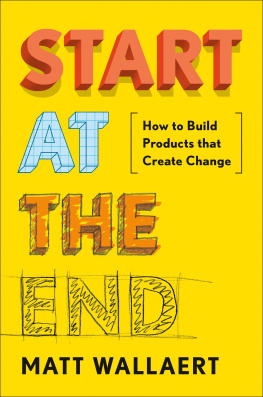Dedicated to my mother, Valeria, for imparting the gifts of graciousness, service, and humility to her wildly self-centered, strong-willed eldest son.
Foreword
This book is made up of 16 essays (or long-form blog posts) written from 2014 to 2016 and published on the Praxis blog. I had quit my corporate job about a year before starting the blog, and after a series of small projects was slowly coming to the realization that I might be able to make a living as a self-employed freelancer.
The question I needed to answer was What am I actually good at? My knowledge and skills didnt fit neatly into any category. I was good with technology but knew next to nothing about programming. I had a good eye for design but could barely wield a digital paintbrush. I was a good writer but had no interest in writing for clients. I had spent years teaching in various contexts, but knew I couldnt fit into a traditional teaching job. Most of my work experience was in non-profit organizations, but I couldnt stand that slow-paced environment any longer.
It seemed like all my experience up to that point had led me to the conclusion that I wasnt cut out for anything in particular. My self-knowledge was boxing me in with all the things I knew I couldnt do, without pointing to things I could do. Applying to jobs didnt help my self-confidence: my eclectic mix of experiences simultaneously made me underqualified for specialist roles, and overqualified for entry-level ones.
My blog became my R&D lab: a place to ramble, rant, play, test, dissect, entertain, summarize, explain, argue, advocate, theorize, and generally way overthink all the ideas I was encountering in my work and my life.
This random walk of exploration is evident in the wide spread of topics I cover in this collection. It includes everything from meditation to science fiction, habit formation to network science, metaphysics to gratitude, organizational theory to email workflows, innovation to mood-hacking. I had no plan, no goal, and no publishing schedule. I wrote whenever my current obsession became too much to bear, and I had to divulge my thoughts to an external medium.
For most of this period I wrote for a very small audience. There was a noticeable bump when I would ask my mom and girlfriend to share a post on Facebook. But the truth is, I very rarely checked the numbers. I wasnt writing for them. I was writing for me.
You see, I have to write to know what I think. All my ideas sound brilliant in the echo chamber of my own mind. It is only when I put down my thoughts, letting them stand on their own strength, that I start to see the cracks and imperfections.
It actually goes beyond this I have to write to think. Otherwise the same old ideas keep circulating round and round, clogging the synapses. Writing is not a result of thinking it is thinking itself , scaffolded by the external props of a keyboard and screen.
As the writing accumulated, I started to converge on a theme: the nature and practice of knowledge work. My interest in conceptual frameworks led me to explore the theory of modern work how it is defined, how it is performed, how it is evolving.
But I also have an incurable practical bent. I can only read so much philosophy before my brain starts to fog over, and I wonder what difference these ideas will make to real people with real problems. Too many years working in non-profits, I suspect. I cant shake the urgency of a world in need.
I began to see that I did have a specialty, but not one typically found in career directories. I seemed to be unusually good at connecting the abstract and the practical, at bridging the divide between the left and right brains. And then packaging that explanation in a format that was easy for others to consume.
The essays in this collection are my journey to develop and calibrate this ability to combine the right mix of conceptual and software tools to form praxis , a theory of practical action.
The title Design Your Work refers to the overall theme tying together these essays: the idea that one can design their own work . You dont have to adopt the same productivity methods as everyone else. You can adapt, tweak, customize, and reframe any aspect of how you work, from how you process emails to how you organize information to how you structure your attention to how you measure your performance. It was all invented by someone else at some point in time, which means you have the option of reinventing it.
There are two ways you can read this book. The first is simply to read the essays in the chronological order in which they appear, which will allow you to track my thinking over time.
The second way is to use the first essay ( ) as a table of contents. This manifesto is grouped into themes, and contains links to every other essay in the book. Reading by theme will allow you to read related essays together.
Thank you for your support, for your trust, and for allowing me to extend my journey a little bit longer. It is the most rewarding pursuit of my life (so far).
Tiago Forte
Oakland, CA
Sept. 17, 2017
A Manifesto of Human-Centered Work

I believe in work.
As a means of , to reaching ones potential, and to a peaceful and just society.
The capacity to perform workto shape the world and make our ideas manifestis among the highest privileges of being human. Any capability so powerful is worth thinking deeply about.
I believe work can be a vehicle for personal growth.
It isnt obvious at first, but work can provide opportunities for nearly every aspect of personal growth: learning, , and making a positive impact on the world.
Any experience in life can inspire growth. I figure, why not choose the activity you spend most of your life doing anyway? Personal growth is expensive, and work conveniently provides both a forum and a funding mechanism.
I believe work can be an act of self-expression.
It doesnt happen automatically, but people can imbue their work with the passion, the creativity, and the purpose that give their life meaning.
This is different from doing what you love all the time. Passion needs truth, and the world into which we send our work is nothing if not truthful.
I believe work can and should be intensely enjoyable.
I dont believe that we should have to suffer to produce our lifes work. Beyond being useful, working can be exquisitely fun. At its best, it provides the ideal conditions for human happiness: working in small teams under difficult conditions, striving against all odds toward a goal bigger than ourselves.
As children, we recognize no division between labor and play. The reinvention of work is really the remembering of a time when there was nothing but action and perception, intertwined in an endless fascination with the world around us.
I believe productivity is an excellent sandbox for life.
Anything worth doing, and especially anything we have to do, is worth doing well. Productivity makes an excellent sandbox because it operates according to the same principles found in any other area of life.
And it leakssuccess in productivity is easily translated to success elsewhere. If we want to free up time and energy to pursue what matters to us, its a good idea to start by the boring but necessary activities we have to do to get by.
I believe we need a new conception of what work is and what its for.









